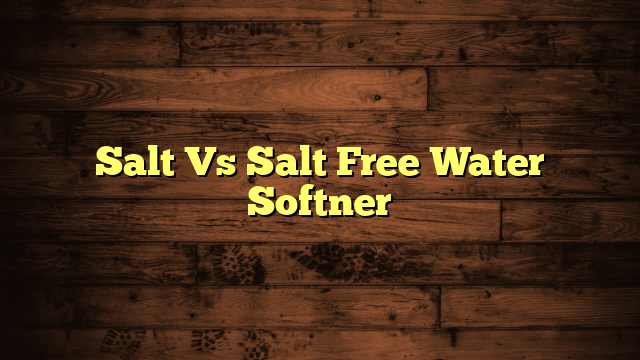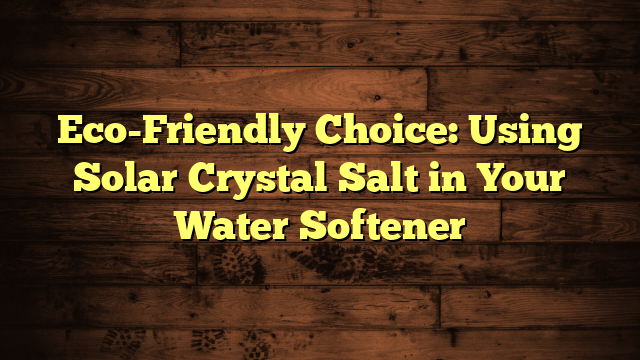Salt Vs Salt Free Water Softner
It's a coincidence that both salt and salt-free water softeners are often debated when you're considering options for your home. You might find yourself wondering which system truly meets your needs, especially when balancing efficiency and environmental impact. While salt-based systems promise effective hardness removal, salt-free alternatives offer a unique approach to water conditioning. With both options presenting distinct advantages, how do you decide which one aligns with your lifestyle while ensuring the best water quality? Understanding the ins and outs of each could greatly influence your choice.
Key Takeaways
- Salt-based water softeners effectively remove hard minerals like calcium and magnesium, preventing scale buildup in pipes and appliances.
- Salt-free water softeners condition water without adding sodium, appealing to health-conscious consumers and maintaining natural minerals.
- Salt-based systems require regular salt refills and maintenance, while salt-free systems have lower maintenance needs and no ongoing salt costs.
- Initial costs for salt-based systems are higher, but long-term savings may occur due to reduced plumbing issues; salt-free systems often have lower upfront costs.
- Both systems require routine inspections, but salt-free options promote environmental benefits by minimizing water pollution and maintaining soil health.
Understanding Hard Water
Hard water, often a common household issue, contains high levels of minerals like calcium and magnesium. You mightn't notice its effects immediately, but over time, hard water can lead to significant problems in your home.
One of the most noticeable hard water effects is the buildup of limescale in pipes and appliances, which can reduce efficiency and increase repair costs. It can also leave unsightly spots on dishes, glassware, and fixtures, making your cleaning routine more challenging.
Hard water sources are often found in areas with high mineral content in the groundwater, typically from limestone or chalk deposits. If you get your water from a well or live in certain regions, you're more likely to encounter hard water.
You may even notice a difference when washing your hair or skin; hard water can make it feel dry and lifeless, as soap doesn't lather as well.
Understanding hard water is essential for maintaining your home and ensuring your appliances work efficiently. By recognizing its sources and effects, you can make informed decisions on how to address this common issue effectively.
How Salt Water Softeners Work
The effectiveness of salt water softeners lies in their ability to replace hard minerals with sodium ions, greatly improving water quality. These systems utilize an ion exchange mechanism, where hard water passes through a resin bed filled with sodium ions. As the water flows through, calcium and magnesium—common culprits of hardness—attach to the resin and displace the sodium ions. This process results in softened water that's free from the mineral build-up that can damage pipes and appliances.
However, over time, the resin becomes saturated with calcium and magnesium, losing its functionality. That's where the salt regeneration process comes in. You'll add a salt solution to the system, typically made from sodium chloride. This solution flushes the resin bed, allowing sodium ions to replace the hard minerals that have accumulated.
Once the regeneration cycle is complete, your system is ready to provide softened water again.
Understanding how these processes work can help you appreciate the value of maintaining your salt water softener. Regular maintenance guarantees the unit operates efficiently, providing you with the high-quality water you need for your home.
Benefits of Salt Water Softeners
If you're considering a water softening solution, salt water softeners offer numerous benefits that can enhance your home's water quality. One of the key advantages is salt efficiency. These systems effectively remove hard minerals like calcium and magnesium, preventing scale buildup in your pipes and appliances. This not only prolongs the life of your plumbing but also helps your water heater and dishwasher run more efficiently.
Moreover, using a salt water softener improves water clarity. You'll likely notice a significant difference in how your water looks and feels. Softer water enhances the effectiveness of soaps and detergents, leading to cleaner dishes and brighter laundry. You'll also find that your skin feels better after showering, as softer water is gentler and less drying.
Another benefit is the reduction of soap scum and mineral deposits on appliances and fixtures, saving you time on cleaning. In addition, your plumbing system will experience fewer clogs, which translates to lower maintenance costs.
With all these advantages, it's clear that a salt water softener can be a wise investment for your home, providing both immediate and long-term benefits.
Exploring Salt-Free Alternatives
When considering a water softening solution, salt-free alternatives can be an appealing option for homeowners looking to reduce sodium intake while still improving water quality.
Salt-free technology operates differently than traditional systems. Instead of using salt to remove minerals, these systems often utilize mineral-based systems that condition water without adding sodium.
Here are some features of salt-free alternatives:
- Reduced Sodium Levels: Great for health-conscious individuals.
- Environmentally Friendly: No brine discharge, minimizing environmental impact.
- Low Maintenance: Generally requires less upkeep than salt-based systems.
- Improved Water Taste: Maintains natural minerals, enhancing flavor.
- Longer Lifespan for Appliances: Helps prevent scale buildup without harsh chemicals.
Advantages of Salt-Free Systems
When considering a salt-free water softener, you'll find several advantages that make it an appealing choice.
These systems not only benefit the environment by reducing salt discharge but also require less maintenance compared to traditional options.
Plus, they offer health considerations, as you won't be adding sodium to your water supply, which can be important for those monitoring their intake.
Environmental Benefits
Salt-free water softeners offer several compelling environmental benefits that make them an appealing choice for homeowners. By opting for these systems, you contribute to sustainable practices that minimize your ecological impact. Unlike traditional salt-based softeners, salt-free systems don't discharge salty water into the environment, preserving local water quality.
Here are some key advantages you can enjoy:
- Reduced water pollution: No brine discharge means cleaner waterways.
- Less resource depletion: Salt-free systems use less water for regeneration, conserving this essential resource.
- Minimal chemical use: These systems operate without harsh chemicals, making them safer for your home and the environment.
- Lower carbon footprint: By requiring less energy for operation and maintenance, you help reduce greenhouse gas emissions.
- Enhanced soil health: Using softened water in your landscape can improve soil quality without adding sodium.
Choosing a salt-free water softener not only benefits your household but also promotes healthier ecosystems.
Lower Maintenance Requirements
Making the switch to a salt-free water softener not only benefits the environment but also simplifies your life with lower maintenance requirements.
Unlike traditional salt-based systems, salt-free alternatives require minimal upkeep, allowing you to enjoy maintenance efficiency. You won't need to regularly replenish salt, which can be a hassle, especially if you have a busy schedule.
These systems operate using a different technology that reduces scale buildup without the use of sodium, which means you'll spend less time worrying about maintenance tasks. This leads to greater system longevity, ensuring that your investment lasts longer and performs effectively.
Additionally, you won't have to deal with the mess of handling salt bags or cleaning brine tanks.
This ease of use is particularly beneficial for families and individuals who prefer a straightforward, hassle-free solution to hard water issues.
Health Considerations
While traditional salt-based water softeners can introduce higher sodium levels into your home's water supply, opting for a salt-free system helps maintain healthier water for you and your family.
This choice minimizes health risks associated with excessive sodium intake, especially for those with hypertension or heart issues. Additionally, salt-free systems can enhance mineral absorption, allowing your body to benefit from essential minerals like calcium and magnesium.
Here are some advantages of salt-free systems:
- Reduced Sodium Intake: Lower sodium levels in your drinking water can help manage blood pressure.
- Improved Taste: Many people find the taste of salt-free water cleaner and more invigorating.
- Enhanced Mineral Content: Salt-free systems retain beneficial minerals that promote health.
- Eco-Friendly: These systems use less energy and produce less waste than salt-based alternatives.
- Fewer Skin Irritations: Softer water without excess salt can be gentler on your skin.
Cost Comparison of Both Systems
When evaluating a water softener, understanding the cost differences between salt-based and salt-free systems is essential. Salt-based systems typically require a higher initial investment. You'll need to purchase the unit itself and regularly buy salt for regeneration.
While this might seem costly upfront, these systems can offer long-term savings. They effectively prolong the lifespan of your plumbing and appliances by reducing scale buildup, which can save you money on repairs and replacements.
On the other hand, salt-free systems often have a lower initial investment and don't require ongoing purchases of salt. However, it's crucial to recognize that their effectiveness can vary. They may not soften water as thoroughly as salt-based options, which could lead to issues down the line.
So, while you might save money initially, you could encounter additional expenses due to less efficient water treatment.
Ultimately, the choice between these systems comes down to weighing initial investments against potential long-term savings. Be sure to evaluate not just the upfront costs, but also how each system might impact your water quality and maintenance expenses over time.
Choosing the Right Solution
When you're choosing between a salt and a salt-free water softener, consider several key factors.
You'll want to weigh the cost-effectiveness of each system, how they impact water quality, and the maintenance requirements involved.
Cost-Effectiveness Comparison
Choosing between a salt-based water softener and a salt-free alternative can greatly impact your budget and long-term expenses.
When evaluating cost-effectiveness, it's crucial to conduct a thorough cost analysis, evaluating various pricing factors that influence your decision.
Here are some key elements to keep in mind:
- Upfront Costs: Salt-based systems may have lower initial costs, while salt-free options can be pricier.
- Maintenance Expenses: Salt-free systems usually require less maintenance, potentially saving you money over time.
- Salt Purchases: With salt-based softeners, regular salt purchases add to ongoing expenses.
- Longevity: Salt-free systems often have a longer lifespan, which can affect your overall investment.
- Water Usage: Reflect on how each system impacts your water bill; salt-based units might use more water during regeneration.
Water Quality Impact
The water quality produced by your softener can considerably affect your home and health.
When it comes to choosing between salt-based and salt-free water softeners, understanding water hardness is essential. Salt-based systems effectively remove minerals like calcium and magnesium, which cause hardness. This process prevents mineral buildup in your pipes and appliances, extending their lifespan.
On the other hand, salt-free systems don't remove these minerals; instead, they condition the water to prevent scale formation. While you won't get rid of the hardness completely, you'll still reduce its negative impacts.
If you're concerned about the potential health risks of sodium intake, a salt-free option might be more appealing.
Maintenance Requirements Differences
Maintaining your water softener can vary considerably depending on whether you opt for a salt-based or salt-free system.
Salt-based systems generally require more frequent maintenance due to their reliance on salt for ion exchange. You'll need to regularly check the salt levels and replenish them, which can be a bit of a hassle.
In contrast, salt-free systems tend to have lower maintenance frequency since they don't require salt replenishment, but they do need occasional cleaning to guarantee peak performance.
Here are some key maintenance considerations:
- Salt Level Checks: Regularly monitor and refill salt in salt-based systems.
- Cleaning: Salt-free systems might need descaling agents or vinegar for cleaning.
- System Inspections: Periodically inspect both systems for leaks or corrosion.
- Resin Replacement: In salt-based systems, you may need to replace resin every few years.
- Professional Servicing: Schedule annual check-ups for both systems to guarantee system longevity.
Understanding these differences helps you choose the right solution for your needs, balancing maintenance frequency with effective water treatment.
Frequently Asked Questions
Do Salt Water Softeners Require Regular Maintenance?
Yes, salt water softeners do require regular maintenance. You'll need to check the salt levels and clean the system periodically. This maintenance frequency enhances system longevity, ensuring it operates efficiently for years to come.
Can Salt-Free Systems Remove Existing Hard Water Deposits?
Ever noticed stubborn hard water deposits on your fixtures? Salt-free systems don't directly remove existing deposits, but they can help prevent new ones from forming, making maintenance easier and keeping your surfaces cleaner over time.
Are Salt Water Softeners Safe for Drinking Water?
When considering drinking safety, salt water softeners can raise health concerns due to sodium levels. If you're on a low-sodium diet or have health issues, it's best to consult a professional before drinking softened water.
How Long Do Salt-Free Systems Typically Last?
Like a reliable friend, salt-free systems typically last around 5 to 10 years. Your longevity expectations should consider system durability; proper maintenance can extend their life, ensuring you enjoy soft water for longer.
Can I Switch From Salt to Salt-Free Systems Easily?
You can switch systems, but the process depends on your current system compatibility. Check manufacturer guidelines to guarantee a smooth changeover and consider consulting a professional for a hassle-free installation experience.
Conclusion
In the grand showdown of salt versus salt-free water softeners, your choice hinges on your needs and values. If you crave the classic softness and don't mind the upkeep, salt systems might be your go-to. However, if you're after a greener, low-maintenance option that keeps beneficial minerals intact, salt-free systems shine bright. Ultimately, weigh the benefits, consider your lifestyle, and make the decision that flows best for you and your household. Your water deserves it!







